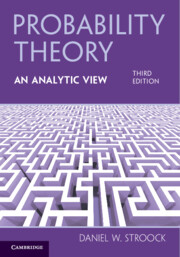Book contents
- Frontmatter
- Dedication
- Contents
- Preface
- Notation
- 1 Sums of Independent Random Variables
- 2 The Central Limit Theorem
- 3 Infinitely Divisible Laws
- 4 Lévy Processes
- 5 Conditioning and Martingales
- 6 Some Extensions and Applications of Martingale Theory
- 7 Continuous Parameter Martingales
- 8 Gaussian Measures on a Banach Space
- 9 Convergence of Measures on a Polish Space
- 10 Wiener Measure and Partial Differential Equations
- 11 Some Classical Potential Theory
- References
- Index
7 - Continuous Parameter Martingales
Published online by Cambridge University Press: 07 November 2024
- Frontmatter
- Dedication
- Contents
- Preface
- Notation
- 1 Sums of Independent Random Variables
- 2 The Central Limit Theorem
- 3 Infinitely Divisible Laws
- 4 Lévy Processes
- 5 Conditioning and Martingales
- 6 Some Extensions and Applications of Martingale Theory
- 7 Continuous Parameter Martingales
- 8 Gaussian Measures on a Banach Space
- 9 Convergence of Measures on a Polish Space
- 10 Wiener Measure and Partial Differential Equations
- 11 Some Classical Potential Theory
- References
- Index
Summary
Section 7.1 provides a brief introduction to the theory of martingales with a continuous parameter. As anyone at all familiar with the topic knows, anything approaching a full account of this theory requires much more space than a book like this can provide. Thus, I deal with only its most rudimentary aspects, which, fortunately, are sufficient for the applications to Brownian motion that I have in mind. Namely, in §7.2 I first discuss the intimate relationship between continuous martingales and Brownian motion (Lévy’s martingale characterization of Brownian motion), then derive the simplest (and perhaps most widely applied) case of the Doob–Meyer Decomposition Theory, and finally show what Burkholder’s Inequality looks like for continuous martingales. In the concluding section, §7.3, the results in §7.1 and §7.2 are applied to derive the Reflection Principle for Brownian motion.
- Type
- Chapter
- Information
- Probability Theory, An Analytic View , pp. 235 - 263Publisher: Cambridge University PressPrint publication year: 2024

